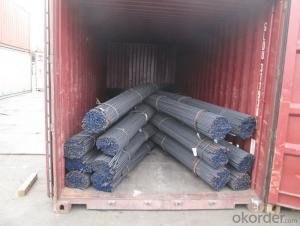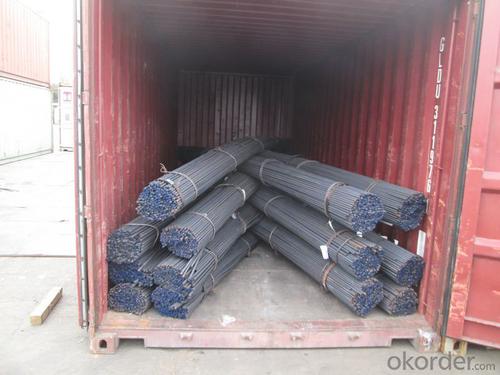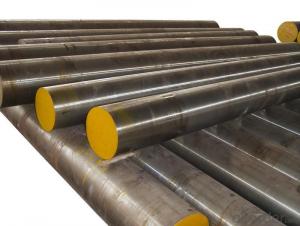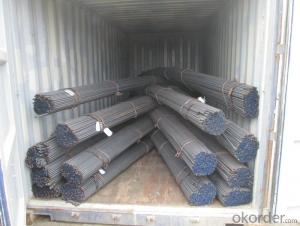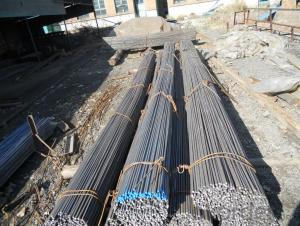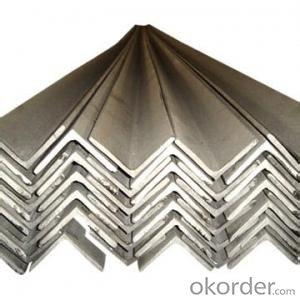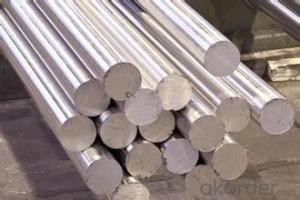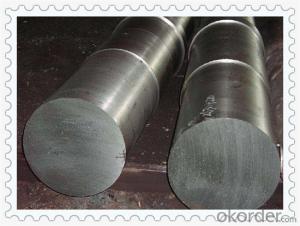Q235 Bearing Steel Round Bar Product with high quality
- Loading Port:
- Tianjin
- Payment Terms:
- TT or LC
- Min Order Qty:
- 25 m.t.
- Supply Capability:
- 7000 m.t./month
OKorder Service Pledge
OKorder Financial Service
You Might Also Like
Specification
OKorder is offering Q235 Bearing Steel Round Bar Product with high quality with worldwide shipping. Our supplier is a world-class manufacturer of steel, with our products utilized the world over. OKorder annually supplies products to European, North American and Asian markets. We provide quotations within 24 hours of receiving an inquiry and guarantee competitive prices.
Product Applications:
Q235 Bearing Steel Round Bar Product with high quality are ideal for structural applications and are widely used in the construction of buildings and bridges, and the manufacturing, petrochemical, and transportation industries.
Product Advantages:
OKorder's Q235 Bearing Steel Round Bar Product with high quality are durable, strong, and resist corrosion.
Main Product Features:
· Premium quality
· Prompt delivery & seaworthy packing (30 days after receiving deposit)
· Corrosion resistance
· Can be recycled and reused
· Mill test certification
· Professional Service
· Competitive pricing
Product Description:
Specifications of Steel Round Bar Products
1. Grade: Q235, A36, SS400, S235JR
2. Feature: Unbreakable, grinding resistant and high impact value
3. Diameter: 8mm-150mm
4. Performance: Mainly for civil construction
5. Characteristics: Even hardness, no deformation, no breaking, no mal-roundness
6. Technique: Hot rolled
7. Mass: Mass (kg/m) = Diameter (mm) × Diameter (mm) × 0.00617
Usage and Applications of Steel Round Bar Products
1. Steel round bar products is used in construction and a large number of architectural and engineering structures. And it can be used in production of handrail, windows, machinery, telecom and curtain wall.
2. It can be used in the fields like metal mines, cement plants, water coal slurry, power stations and chemical industry.
3. Besides, we can supply some especial material steel round bar that can be used for main shaft of steamer, hummer shank, with big section and supper force.
4. Recommended watchcase factory, screw factory and other cold stamping products industry use.
Packaging & Delivery of Steel Round Bar Products
Packaging Detail: All goods are packed in bundle with steel strips and shipped by break bulk vessel or container (depend on target market and different ports)
Delivery Detail: 45 days
Trade terms: FOB, CFR, CIF
MOQ: 25 tons per specification; we can negotiate the quantity if the specification is normal or we have stock of one specification.
Weight: The price invoicing on theoretical weight basis or actual weight basis depends on customer’s request.
Shipment: The shipment of bulk break or container is depends on customer’s request and the situation of the port of destination.
Documents given: Full set of original clean on board bill of lading; Original signed commercial invoice; Original packing list; Policy of insurance; Certificate of origin and what the target market needs.
Production Flow of Steel Round Bar Products
Material prepare (billet) — heat up — rough rolling — precision rolling — cooling — packing — storage and transportation
Characteristics of Steel Round Bar Products
1. The steel in which the main interstitial alloying constituent is carbon in the range of 0.12–2.0%.
2. As the carbon percentage content rises, steel has the ability to become harder and stronger through heat treating; however it becomes less ductile.
3. Regardless of the heat treatment, higher carbon content reduces weld ability. In carbon steels, the higher carbon content lowers the melting point.
4. Quality should be in conformity with the specification of the manufacturer. Quantity and packing conditions should be in conformity with the term in the contract.
FAQ:
Q1: Why buy Materials & Equipment from OKorder.com?
A1: All products offered byOKorder.com are carefully selected from China's most reliable manufacturing enterprises. Through its ISO certifications, OKorder.com adheres to the highest standards and a commitment to supply chain safety and customer satisfaction.
Q2: How soon can we receive the product after purchase?
A2: Within three days of placing an order, we will begin production. The specific shipping date is dependent upon international and government factors, but is typically 7 to 10 workdays.
Q3: How do we guarantee the quality of our products?
A3: We have established an advanced quality management system which conducts strict quality tests at every step, from raw materials to the final product. At the same time, we provide extensive follow-up service assurances as required.
Images:
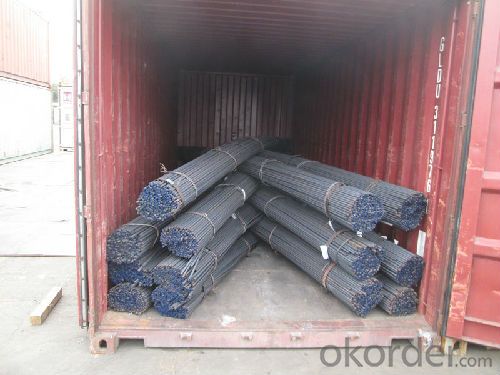
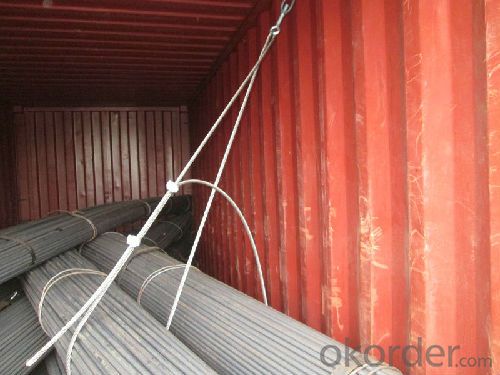
- Q: What are the different types of steel round bar surface finishes for improved aesthetics?
- Some common types of steel round bar surface finishes for improved aesthetics include polished, brushed, satin, and bead blasted finishes.
- Q: What are the advantages of using nickel-copper alloy steel round bars?
- There are several advantages of using nickel-copper alloy steel round bars. Firstly, nickel-copper alloy steel has excellent resistance to corrosion and oxidation. This makes it ideal for applications in harsh environments, such as marine or chemical industries, where the bars may come into contact with corrosive substances or saltwater. The high resistance to corrosion ensures the longevity and durability of the round bars, reducing the need for frequent replacements. Secondly, nickel-copper alloy steel round bars have excellent mechanical properties. The addition of nickel and copper to the alloy enhances its strength, toughness, and hardness. This makes the bars suitable for heavy-duty applications that require high strength and durability, such as in construction, manufacturing, and engineering. The superior mechanical properties of nickel-copper alloy steel round bars allow them to withstand heavy loads and resist deformation or breakage, contributing to the overall safety and reliability of the structures or components they are used in. Another advantage of using nickel-copper alloy steel round bars is their excellent thermal stability. The alloy has a low coefficient of thermal expansion, meaning it can withstand high temperatures without significant dimensional changes. This property is particularly important in applications that involve exposure to extreme heat, such as in the aerospace or power generation industries. The thermal stability of the round bars ensures their dimensional integrity, reducing the risk of warping or cracking under high-temperature conditions. Furthermore, nickel-copper alloy steel round bars offer good electrical conductivity. This property is beneficial in applications that require the transmission of electric current, such as in electrical wiring or power distribution systems. The high electrical conductivity of the alloy ensures efficient and reliable electrical connections, minimizing power loss and maximizing performance. In conclusion, the advantages of using nickel-copper alloy steel round bars include excellent corrosion resistance, superior mechanical properties, thermal stability, and good electrical conductivity. These characteristics make the bars suitable for a wide range of applications in various industries, providing durability, strength, and reliability.
- Q: What are the different surface treatments available for tool steel round bars?
- Some of the different surface treatments available for tool steel round bars include: 1. Nitriding: This process involves diffusing nitrogen into the surface of the tool steel, which improves hardness, wear resistance, and corrosion resistance. 2. Hard Chrome Plating: This treatment involves applying a layer of chromium to the surface of the tool steel, which enhances hardness, wear resistance, and resistance to corrosion. 3. Black Oxide Coating: This treatment involves a chemical reaction that creates a black oxide layer on the surface of the tool steel, providing improved appearance and some corrosion resistance. 4. PVD Coating: Physical Vapor Deposition (PVD) is a process that deposits a thin film coating onto the surface of the tool steel. Different types of PVD coatings can improve hardness, lubricity, and resistance to wear and corrosion. 5. DLC Coating: Diamond-Like Carbon (DLC) coating is a type of PVD coating that incorporates carbon to provide enhanced hardness, low friction, and wear resistance. 6. Powder Coating: This process involves applying a dry powder coating to the surface of the tool steel, which is then cured to create a durable and attractive finish. These surface treatments can be chosen based on the specific requirements of the tool steel application, such as improving wear resistance, reducing friction, enhancing appearance, or providing corrosion resistance.
- Q: How are steel round bars used in the construction of high-rise buildings?
- Steel round bars are commonly used in the construction of high-rise buildings due to their strength, durability, and versatility. These bars are typically made of carbon steel, which has excellent mechanical properties and can withstand high loads and pressures. In the construction of high-rise buildings, steel round bars are primarily used in reinforced concrete structures. They are commonly used as reinforcement in concrete beams, columns, and slabs. The bars are embedded in the concrete to provide additional strength and stiffness to the overall structure. One of the main advantages of using steel round bars is their ability to resist tension forces. Concrete is strong in compression but weak in tension, so the steel bars act as tension reinforcement, preventing the concrete from cracking or failing under tension loads. This helps to enhance the structural integrity and overall safety of the building. Additionally, steel round bars can be easily bent, shaped, and welded, allowing for flexible design and construction possibilities. They can be customized to specific lengths and diameters to suit the requirements of the building project. This versatility makes them ideal for constructing various structural elements, such as beams and columns, which need to be precisely engineered to support the weight and stresses of a high-rise building. Moreover, steel round bars have excellent resistance to corrosion, which is crucial in the construction of high-rise buildings that are exposed to various environmental elements. The corrosion-resistant properties of steel ensure the long-term durability and lifespan of the structure. Overall, steel round bars play a vital role in the construction of high-rise buildings by providing strength, durability, and flexibility to the reinforced concrete structures. They enhance the overall structural integrity, safety, and longevity of the building, making them an essential component in modern construction practices.
- Q: How are steel round bars used in the manufacturing of conveyor systems?
- Steel round bars are commonly used in the manufacturing of conveyor systems due to their durability and strength. These bars are often used as the main structural components for conveyor belts, rollers, and pulleys. In conveyor systems, the steel round bars are typically used to form the framework or support structure of the conveyor. They are used to create the main body of the conveyor, providing stability and strength to withstand the weight and movement of the materials being transported. For instance, steel round bars are often used to create the conveyor belt support structure. These bars are typically bent or welded into a circular shape to form the rollers or idlers that support the conveyor belt. The bars are usually spaced evenly along the length of the conveyor, providing a stable platform for the belt to move on. Additionally, steel round bars are also used to create the pulleys that drive the conveyor belt. These pulleys are typically made of a solid steel round bar, which is machined to the desired size and shape. The pulleys are then mounted on the conveyor system and connected to a motor or other power source, which allows them to rotate and move the conveyor belt. Overall, steel round bars play a crucial role in the manufacturing of conveyor systems by providing the necessary strength and stability required for efficient material handling. Their durability and resistance to wear and tear make them a suitable choice for the demanding conditions of conveyor applications.
- Q: Can steel round bars be used in the production of medical equipment?
- Medical equipment can indeed utilize steel round bars. This is because steel is a widely employed material in the production of medical devices and equipment. Its strength, durability, and versatility make it a popular choice. By utilizing steel round bars, one can fashion various components of medical equipment, including surgical instruments, orthopedic implants, diagnostic tools, and hospital furniture. Steel possesses desirable properties, such as resistance to corrosion and the ability to be sterilized, rendering it suitable for use in the medical sector where hygiene and patient safety are paramount. Furthermore, steel round bars can be easily machined and fabricated into different shapes and sizes, allowing for the customization of medical equipment to fulfill specific requirements.
- Q: Can steel round bars be used for making transmission components?
- Steel round bars are a suitable choice for the fabrication of transmission components. Steel is extensively utilized in the manufacturing sector due to its exceptional strength, durability, and resistance to deterioration. In the production of transmission components like gears, shafts, and couplings, it is customary to employ round bars made of steel. These steel round bars are typically shaped through machining or forging and subsequently subjected to heat treatment to enhance their mechanical attributes. By utilizing steel round bars, the transmission components become capable of enduring substantial loads, facilitating seamless power transmission, and exhibiting an extended lifespan.
- Q: Can steel round bars be used in the manufacturing of appliances?
- Yes, steel round bars can be used in the manufacturing of appliances. Steel is a durable and versatile material that can be shaped into different forms, including round bars, which can be used for various purposes in appliance manufacturing such as structural support, handles, or components.
- Q: What are the considerations for selecting the right steel grade for a round bar?
- When selecting the right steel grade for a round bar, there are several considerations to be taken into account. Firstly, it is important to consider the intended application of the round bar. Different steel grades have varying properties that make them suitable for specific purposes. For example, if the round bar will be used in a high-temperature environment, a steel grade with excellent heat resistance such as stainless steel or high-alloy steel would be ideal. On the other hand, if the round bar will be used in structural applications, a steel grade with good strength and ductility, such as carbon steel, may be more appropriate. Another consideration is the desired mechanical properties of the round bar. This includes factors such as the required tensile strength, yield strength, hardness, and toughness. These properties can vary significantly between different steel grades, so it is important to choose a grade that meets the specific requirements of the application. The corrosion resistance of the steel grade is also an important consideration. If the round bar will be exposed to corrosive environments, such as in marine or chemical applications, a stainless steel grade with high resistance to corrosion would be recommended. Alternatively, if corrosion resistance is not a major concern, a carbon steel grade may be more cost-effective. Cost is another factor that should be taken into consideration when selecting a steel grade for a round bar. Different steel grades have varying costs based on factors such as availability, demand, and manufacturing processes. It is important to balance the desired properties of the round bar with the available budget to ensure cost-effectiveness. Furthermore, it is important to consider the manufacturability of the steel grade. Some steel grades may be more difficult to machine or weld, which can impact the production process and cost. It is important to choose a steel grade that is readily available and can be easily processed to meet the required specifications. Lastly, it is always advisable to consult with steel suppliers, engineers, or metallurgists to ensure that the chosen steel grade aligns with the specific requirements of the application. They can provide valuable insights and recommendations based on their expertise and experience in the industry.
- Q: What are the different grades of alloy steel round bars?
- There are several different grades of alloy steel round bars, including but not limited to, 4140, 4340, 8620, and 52100. Each grade offers specific properties and characteristics that make them suitable for different applications and industries.
Send your message to us
Q235 Bearing Steel Round Bar Product with high quality
- Loading Port:
- Tianjin
- Payment Terms:
- TT or LC
- Min Order Qty:
- 25 m.t.
- Supply Capability:
- 7000 m.t./month
OKorder Service Pledge
OKorder Financial Service
Similar products
Hot products
Hot Searches
Related keywords
